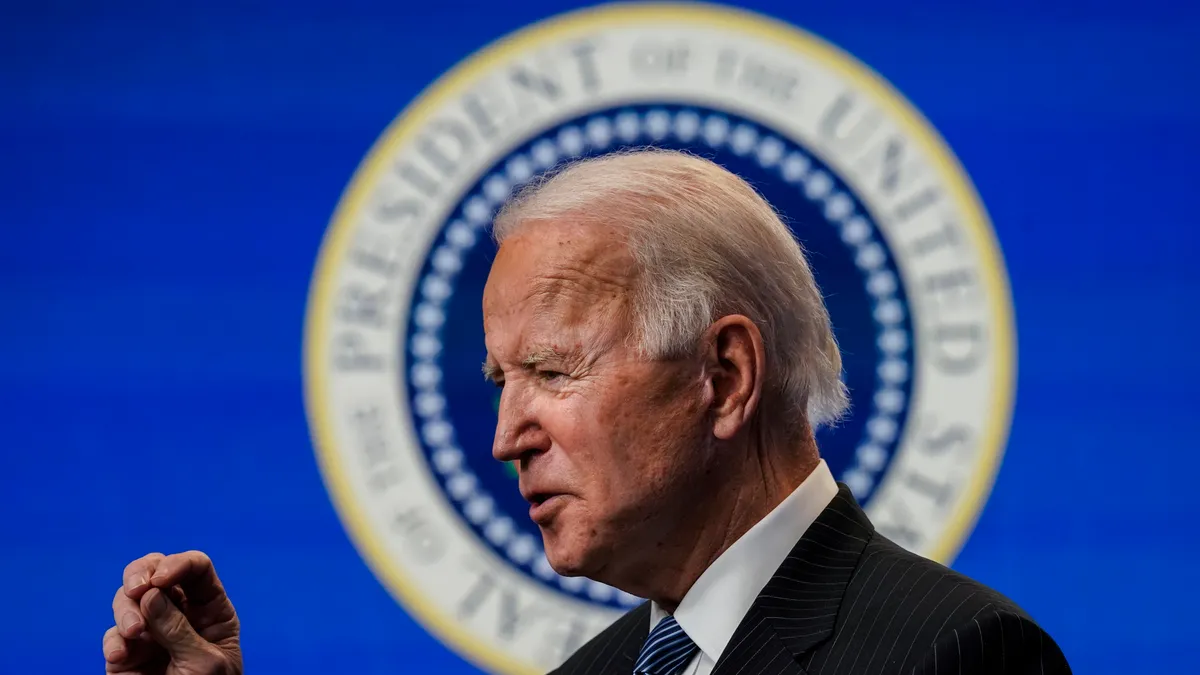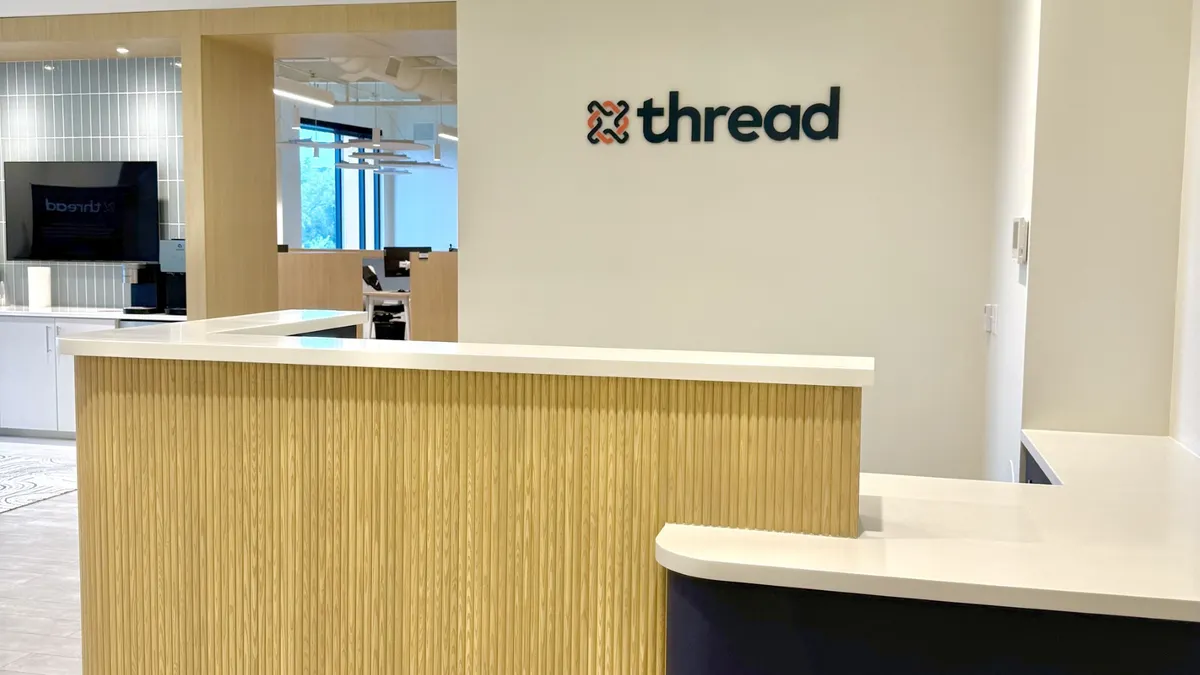President Joe Biden on Thursday announced an executive action to pardon all prior federal offenses of simple possession of marijuana, and encouraged governors to follow suit with regard to state offenses.
And in what is largely seen as a major step toward decriminalization, the president said he is asking the secretary of health and human services and the Justice Department to review cannabis’ designation as a Schedule 1 drug, a classification reserved for the most dangerous substances, such as heroin and LSD.
“Too many lives have been upended because of our failed approach to marijuana. It’s time that we right these wrongs,” Biden said in a statement.
The potential for cannabis to be de-scheduled, or taken off the controlled substances list, could be a game-changer for some of the banks that serve the emerging market, industry observers said.
“De-scheduling would largely remove many, if not all, of the legal hurdles and fears that keep financial institutions from entering this space,” said Sahar Ayinehsazian, a partner at cannabis law firm Vicente Sederberg, where she co-chairs the banking and financial services access group.
While it is likely that the increased compliance burdens associated with banking cannabis would remain for the time being, fear of federal prosecution would largely be gone, Ayinehsazian said.
“The risk of federal prosecution, combined with the heightened compliance burden and reputational concerns related to cannabis has been the main hurdles to cannabis banking,” she added. “Removing the risk of federal prosecution through de-scheduling should help to lessen the compliance burden and work to eviscerate the discriminatory reputational risks associated with cannabis, thereby vastly increasing access to banking services for legal and compliant cannabis businesses.”
Some cannabis banking analysts, however, said de-scheduling the drug could actually usher in more compliance reporting requirements for banks involved in the space.
“The increased access poses a problem for nefarious capital to enter the financial system,” Mark Lozzi, CEO of cannabis compliance fintech Confia.
While changing cannabis' Controlled Substances Act designation would provide additional comfort to bankers who choose to serve the industry, the existence of the illicit market means banks wouldn’t be absolved from performing their compliance obligations, said Robert Baron, chief experience officer at StandardC, a cannabis banking compliance firm.
“Bankers will still need to perform robust [know-your-customer] and monitoring of their cannabis customers, customers’ clients, and their vendors to mitigate the risk of money laundering that could be injected into the legal cannabis industry from the illicit market,” Baron said.
Compliance hurdles aside, the prospect of banking the emerging industry free of the current legal implications could be enough to entice some firms that have been on the fence, Ayinehsazian said.
“It may be a bit longer before we see the larger players like Wells Fargo, Citi or Chase coming in,” she said.
Lozzi said he thinks de-scheduling could lead to increased participation from banks, but agreed that the uptake would likely not be mainstream.
“Banks will not be required to have a cannabis program. Managing a cannabis program is expensive and could be distracting to a bank’s core operation,” he said, adding some financial institutions may be wary of the reputational risks associated with operating a marijuana banking unit.
“So while I think there will be increased access for cannabis operators, it will not be the case where you can walk into any bank to open your cannabis account,” he said.
New guidance?
A change in cannabis classification could result in a relaxing of the “Marijuana Limited” suspicious activity reports banks are required to file with the Financial Crimes Enforcement Network (FinCEN), Ayinehsazian said.
Such an action might also force FinCEN to amend or issue new guidance to financial institutions, Baron said.
“When cannabis is no longer illegal by default, which it has been according to its scheduling within the Controlled Substances Act in 1970, the original guidance is no longer needed and could be reissued to contain more risk-appropriate requirements that are less burdensome on financial institutions,” Baron said.
SAFE Banking
Since banks have largely refrained from servicing marijuana-related businesses due to cannabis’ classification as a Schedule 1 drug, many such businesses deal primarily in cash, making them targets of theft, cannabis reform advocates argued.
The Secure and Fair Enforcement (SAFE) Banking Act, a bill that would provide protections to financial institutions that offer services to cannabis-related businesses, has been touted by bank trade groups and cannabis industry stakeholders as the answer to the industry’s cash problem.
However, despite passing in the House seven times, the Senate has yet to vote on the measure.
In response to Biden’s marijuana reform announcement, Rep. Ed Perlmutter, D-CO, praised the president’s order to review how marijuana is scheduled, but warned a lesser classification would not solve the industry’s banking woes.
“[E]ven if marijuana is moved to a lower schedule on the Controlled Substances Act, we will continue to face banking conflicts between federal and state law,” said Perlmutter, who has introduced the SAFE Act in every Congress since 2013 and announced in January he won’t seek re-election. “The House has already passed a variety of bipartisan cannabis reform bills, including the SAFE Banking Act seven times. Now it’s time for the Senate to follow the House’s lead and pass bipartisan cannabis reform legislation.”
But should Biden’s executive order result in a full de-scheduling of cannabis, some industry observers argued SAFE Banking would no longer be needed.
“Given that de-scheduling would largely solve many of the issues the SAFE Banking Act, in its current iteration, seeks to address, it would make the SAFE Banking Act more of an ancillary action rather than a cornerstone for cannabis banking,” Ayinehsazian said.
Some version of the SAFE Banking Act would likely still be necessary to provide a heightened level of comfort for financial institutions and their chartering, examining and insuring bodies, given that Schedule II drugs are still highly regulated, she added.
Lozzi said he thinks de-scheduling cannabis should be enough to give banks the “air cover they have been waiting for to engage in the space,” but it all depends on what language the de-scheduling entails.
If language calls out banking protections, then the SAFE Banking Act becomes moot, Lozzi said.
But if it doesn’t, some banks may still be too conservative to engage in cannabis until the banking protections are explicitly stated in legislation, he said.
“Factors that make de-scheduling and SAFE Banking both helpful is timing, as the SAFE Banking Act is much more likely to get into legislation faster than de-scheduling,” he added.
Proponents for SAFE Banking managed to attach the legislation to the House-passed National Defense Authorization Act (NDAA) this year.
Attempts to pass the legislation by folding the text into larger bills, however, have failed in the past.





















